Can A Puppy Be Liable For A Dog Bite? What Should You Know
Can a puppy be liable for a dog bite? Just like human kids, puppies need the guidance of their owner to avoid causing trouble when they grow up, but you can’t avoid asking if a puppy can be liable for a dog bite?
It’s not considered vicious to see your puppy bite on wood, your shirt, and their toys, and sometimes, they would try to bite your hand. It’s how they play, so when getting a puppy, expect a whole lot of mess!
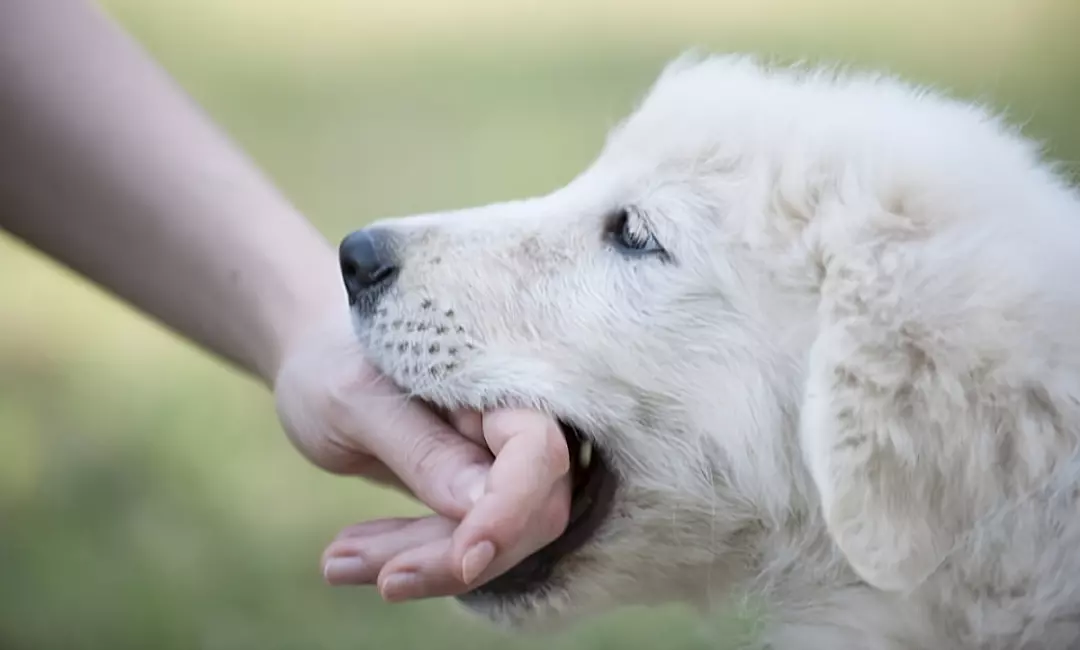
Yet, you don’t want your pet to get used to biting, or else there will come a time when it will injure someone. Dog liability can be a bit of a problem. So, you want to start to discipline your puppy when it’s still young.
A Case Of Puppy Nips
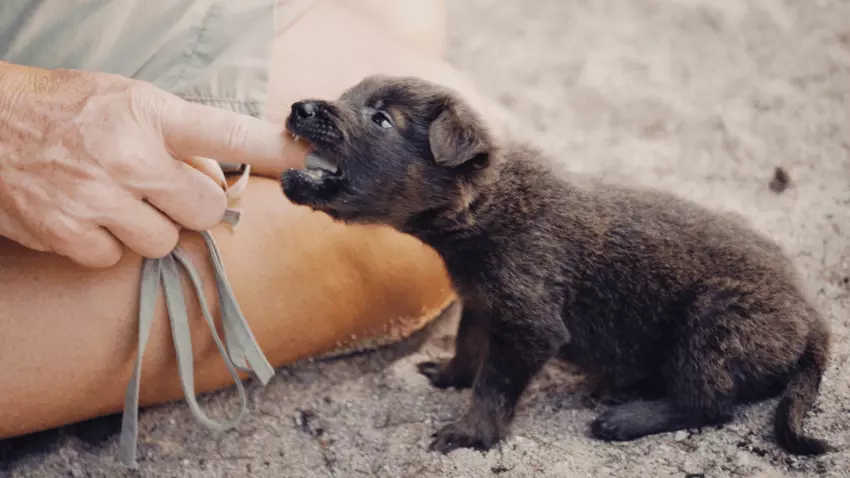
In the case of Tessiero v. Conrad, 186 A.D.2d 330, 588 N.Y.S.2d 200 (N.Y. App. Div. 1992), a seven-month-old puppy bites an infant. The family went to sue the owner and asked for compensation, arguing that the latter should have liability for the injury caused by the puppy.
But for the child’s family to hold the dog owners accountable, they must prove that the owner knew that their dog is aggressive and show evidence that the dog does have vicious tendencies.
Yet, a dog that responded that way doesn’t necessarily mean that it has vicious behavior or tendency. It could be caused by an accident, the person hurt the dog, or that it was just playful at the moment.
So in this case where a puppy nips a child, such an act wouldn’t be considered a vicious behavior according to the court. And the same is true even if it resulted in injury and regardless of the act of the puppy prior to the incident.
The puppy was playful, so, technically, the owner wasn’t liable for the injury. It’s natural for a puppy to mouth people, and an adult should supervise the kid since he was with a puppy. [Please read here why does my dog always carry something in her mouth
Mouthing is considered a “normal canine behavior,” and liability wouldn’t be applicable since it does not show vicious behavior.
Don’t celebrate yet, though. Every case is different; the circumstances may differ. And that means that it would still depend on the law of your state. Some might hold you accountable for an injury caused by your playful pup.
RELATED: Common for Dog Bite Cases in New York
Liability Of The Dog Owner
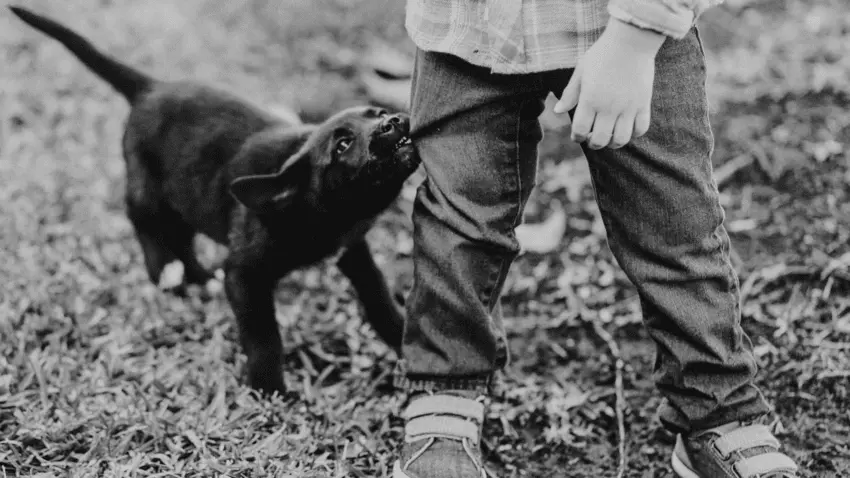
Usually, dog owners involved in puppy nips aren’t liable for the victim’s injury. As the case above described, the child’s family, which is the victim, failed to prove the vicious behavior of the dog or the negligence of the dog owners, so then there is no liability owed.
You don’t want to leave the two of them alone, and you don’t want to know what can happen if you do so.
Regardless, we all know that each state has different approaches regarding dog bites, some are strict, and others can sometimes give a bit of consideration to the one’s being sued.
Nevertheless, you want to know the two statutes you might face if your puppy injured someone gravely.
#1. One-bite rule
Dogs have been man’s best friend, and during the twentieth century, dog keepers or owners are responsible for their pet’s behavior and action, and that’s when the “one bite” rule comes into place.
The “one bite” rule states that when the owner is aware of their dog’s vicious tendencies or knows that their dog can bite someone, they will be held liable for the damages caused by their dog.
The rule comes with a “one free bite” before. With this, the state will punish the owner if the dog bite happens again. It’s like recidivism in the criminal sense; when connected to a dog’s action, it shows relapse into such behavior- the act of biting another person.
Anyway, during modern times, this “one free bite” idea is not acceptable so, even if it’s the first time your dog has bitten someone, you will owe the victim compensation.
Provided, however, the opposing party should prove the following:
- that you are fully aware of its aggressive behavior;
- that if it’s considered a dangerous breed; or
- that it shows signs that it could bite someone but didn’t do something. Please read here landlord dog bite liability
So, as long as the victim can prove that you, as the owner, are knowledgeable about your dog’s behavior, but didn’t take any precautionary measures to avoid such an incident, you will be held liable.
The same is true to dog keepers; if they knew that it could bite the victim during the incident but didn’t stop the dog, it’s deemed to be the dog keeper’s fault.
Now, let’s relate this to puppies; as I have mentioned, puppies are playful, not vicious. However, if you let your puppy roam around your house and bites your visitor since dogs are overprotective of their territory, you might get apprehended.
Nevertheless, this “one bite” rule is often confused with the personal injury liability rule of negligence which is quite fair because of their similar focus. Better yet, you want to observe proper precautions, especially if other people are around your puppy, to avoid such incidents from happening.
#2. Strict liability
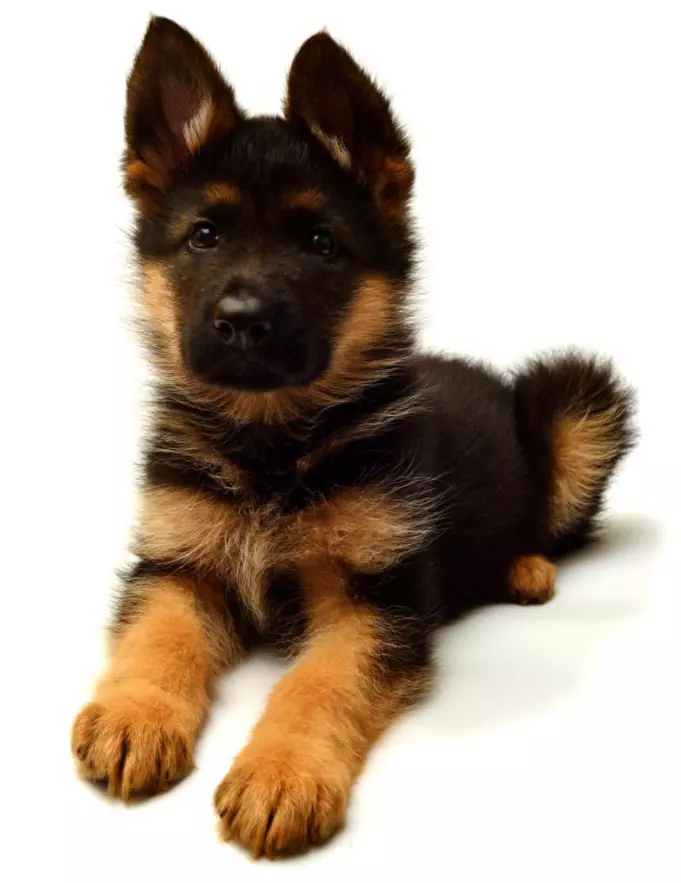
The strict liability laws are often “victim-friendly” since even minor injuries caused by dogs can be held liable. So, if you’re from one of the countries applying the strict liability rule, you want to be very careful as a pet owner.
- If the owner caught the victim breaking the law or trespassing, which triggered the dog to defend their home; or
- If the victim hurt, teased, or provoked the dog.
If the dog owner can prove either of these, he can save himself from possible compensation. So, when it comes to puppies, as long as the victim shows enough evidence of your puppy causing such injuries or damages, you might get sued and pay for the expenses.
Nevertheless, strict liability laws regarding dog bites may vary with every state and how the court interprets your case. The mentioned laws exist to remind dog owners to be responsible and consider the people around them not to get hurt.
But I believe such aggression wouldn’t manifest to your dog if you show it enough love and care and training them to be disciplined, especially around people. Regardless, knowing this, you want to assess your puppy and identify if it needs early intervention with its behavior.
Keep on reading to learn more.
When Does Mouthing Become Aggression?
A typical and playful nipping of your puppy might turn to vicious behavior when you did no intervention.
Puppies could show aggression once frustrated or scared if your puppy tends to growl or starts to bite at you because it’s angry over something, then that’s a signal for you to do something.
Puppy Tantrums And How To Handle It
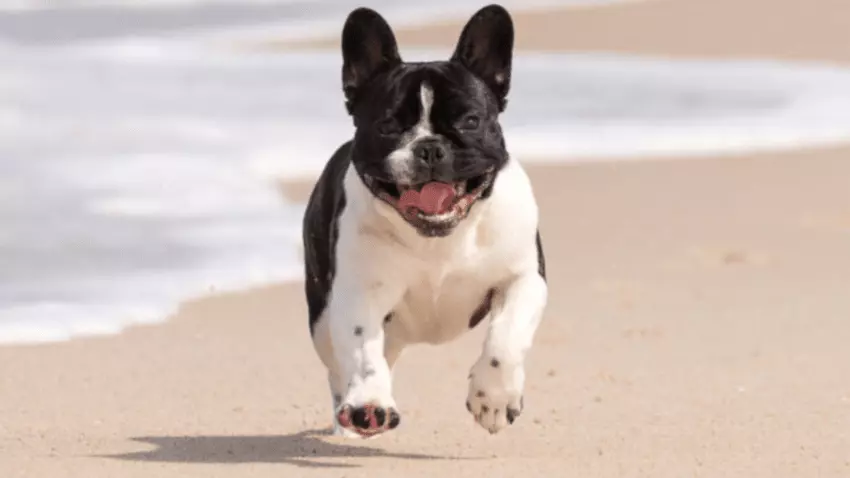
Who knew that puppies throw tantrums as well, just like human kids do?
Every time you go out to the grocery, you would never miss a scene when a kid cries out to her mom to get something, but the parent doesn’t want to and guess what happens next. Yes, a whole lot of crying!
You can relate it to puppies as well, and if you do things it doesn’t like, it would growl at you and sometimes bite you.
But puppy tantrums do not only show when you try to clean your dog because even playtime when you expect your pet to be the happiest could sometimes lead to vicious tendencies.
Remember that a puppy tantrum is severe and shouldn’t be handled lightly. It’s not a playful and usual mouthing, and it happens because your dog is upset.
Now, be a responsible pet owner and follow these steps:
Step #1. Test your dog if it shows tantrums
When you try to carry or make your dog stay still and start to growl, then that’s a sign. That’s what usually a puppy tantrum or aggression would look like, so be aware of that.
Step #2. Never show emotions
Now, when you try to hold your dog and show tantrums, don’t show any emotions. Even if you’re hurt, annoyed, or shocked, pretend that you saw nothing of your puppy’s temper tantrum. Because if you try to fight such behavior, your pet’s aggression might worsen.
Step #3. Stay calm
Stay calm, don’t let go of your puppy no matter how much it struggles, but please don’t hurt your pet.
Step #4. Put your pup down
Once your pup calms down, let your pet go. The behavior wouldn’t end there for sure. If you noticed your dog starts to do it again, clear your schedule and take your dog for professional help. Temper tantrums should be assessed and resolved earlier, as what they say, prevention is better than cure.
What Can I Do When My Puppy Starts To Bite Me?
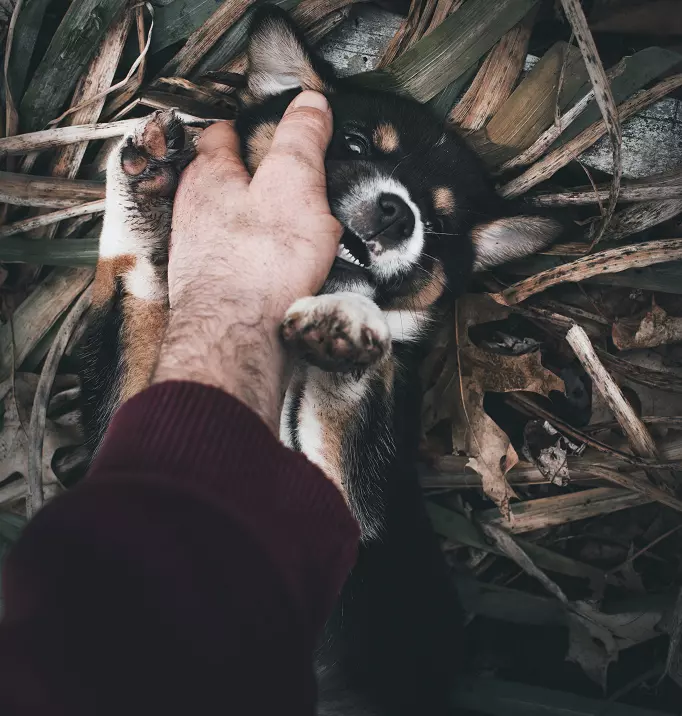
You can’t be avid your puppy to use its mouth often, I mean, a lot! Their dogs, after all, and biting is one of their ways to show their emotions, so it isn’t entirely a negative trait.
However, if your playful bites turn into aggressive and painful ones, you must do something to teach your pet acceptable mouthy behavior.
Our main objective here is to teach your pet to stop biting or mouthing other people. Again, you can’t control such behavior altogether, so what you want to do is let your puppy understand that human skin is not a toy, and it’s fragile if I must say. So, the dog would be gentle when your puppy nips on other people.
#1. Teach your puppy to be gentle
Puppies love to play, and like human children, they are not aware of what is right and wrong and what hurts and not.
There’s this one time when I was babysitting my niece, she grabbed a big water bottle and hit me with it. It hurts a lot! But you can’t blame the child since, you know, it’s still little. But that’s an opportunity to teach my niece not to do it again.
And as for puppies, they tend to bite their owners out of excitement without knowing that it could lead to injuries. That’s why you should teach bite inhibition.
Bite inhibition is the ability of a pup o control the force it applies when mouthing. If a puppy didn’t learn bite inhibition from its owner, the canine would fail to recognize human skin sensitivity.
According to professionals like dog trainers and behaviorists, if a dog learned bite inhibition from people through interactions, there is a lesser chance that its bite could gravely endanger someone if it bites someone out of fear or if someone hurt it.
Mouthing is beneficial for puppies, but if it starts to be painful, make use of the following techniques to teach your puppies when to stop:
#2. Start yelping
When I play with my dog, I will let him sniff my hands and mouth them. At first, I get nervous because I’m afraid that he would bite me, but letting your dog mouth your hand helps them be gentle.
But if the mouthing starts to get hurt, let out a high-pitched yelp and show your pet that you’re hurt, but keep your hand in the same position.
It would serve as a signal for your puppy to stop. It would get startled and eventually let’s go of your hand. But if that doesn’t work, try to say in a stern voice, “You blew it!” or “Too bad!”
Positive affirmation is better than punishing your pet for doing bad. It could cause your puppy to develop negative traits if you always punish them.
So, it’s better to praise your pup for all the small achievements it does if it follows your command or responded to your yelping.
Keep on doing what you and your puppy did, but if your little pal bites you again, start yelping.
Do the steps for 15 minutes, not more than three times.
#3. Initiate time outs
But if yelping doesn’t work, try to switch to a time-out procedure; such a technique will help you control your pet’s mouthing.
When your puppy’s bite is painful, start yelping, and when your pet startles and stops or looks around, then that’s the time you remove your hand.
After that, ignore your pet for a couple of seconds. 10 to 20 would be good enough. But if it proceeds to continue its mouthing, get away from your puppy for 10 to 20 seconds as well.
And, once your pet shows good behavior, encourage it with praise. Please continue to the gentle and playful mouthing, but repeat the time-out procedure once it starts to hurt.
Now, when your puppy abides by your commands and doesn’t bite hard, it’s time for you to tighten the rules a bit and require your pet to be gentle when mouthing a person.
These two methods, yelping and time outs will help you teach your puppy bite inhibition.
Please stick to the process and repeat them repeatedly until your dog can control its bite and be gentle when mouthing.
Related Question
Here are the common questions asked and their answers:
1. Is it alright for my puppy to bite me?
As I mentioned earlier, puppies are plays a lot with their mouth. They would bite and chew stuff. They would also do it to people, mouth, or bite their owner’s hands, limbs, or garments.
It’s normal for them to do so for a seven-week-old puppy, but it would be quite alarming for a three-month-old if such behavior still happens if your pet still bites, especially to you.
2. How to tell if it’s a tantrum or a playful mouthing?
Now, you might observe that your dog does the same, but let me remind you that it can be just a playful mouthing. You see, dog owners find it hard to identify if their dog is having temper tantrums or just playful.
To help you find the difference between the two, a puppy is playful if it shows a relaxed face and body. It might appear wrinkled, but you won’t see lots of tension on your pup’s face.
But a temper tantrum looks different. Your pup’s body would feel stiff or appear to be frozen. It might even snarl or show its teeth to you, and if your puppy bites you, it would feel painful compared to their usual mouthing.
3. Can puppies develop bite inhibition on their own?
Puppies learn bite inhibition when playing with other pups. From what you observe, when dogs play, they would chase and wrestle each other and even bite.
They know how to be gentle when they are playful, and they know when to stop. When the one puppy gets hurt, it will start to yelp, and the offender would step back as it startles from the pup’s cry.
It would last for a second, and the game would go on. Through this, the puppy or who bites would know that it needs to be gentle next time. That’s how puppies learn bite inhibition naturally.
From what you have noticed, this attitude is similar to the techniques I’ve mentioned earlier: the yelping and time-outs. So, we teach our puppies what other dogs would do if they get hurt from mouthing. If they can learn from other pups, they can learn from people too.
4. When and to who should I ask for help?
A professional for such dog behavior is needed to determine if your pet does have vicious tendencies that require proper intervention.
That person should be a Certified Applied Animal Behaviorist or a Diplomate of the American College of Veterinary Behavior to guide and discipline your puppy.
But if you find it challenging to contact such a person, you can reach out to your veterinarian.
Conclusion
Can a puppy be liable for a dog bite? It’s rarely thought to hold a dog owner responsible for an injury caused by a puppy alone. The court would usually let it slide, or as the case above mentioned, nipping and mouthing isn’t always considered a vicious behavior.
In short, there would be no puppy liability, but it would still depend on your state’s dog bite laws and how the court interprets certain cases regarding injuries caused by a pup.
